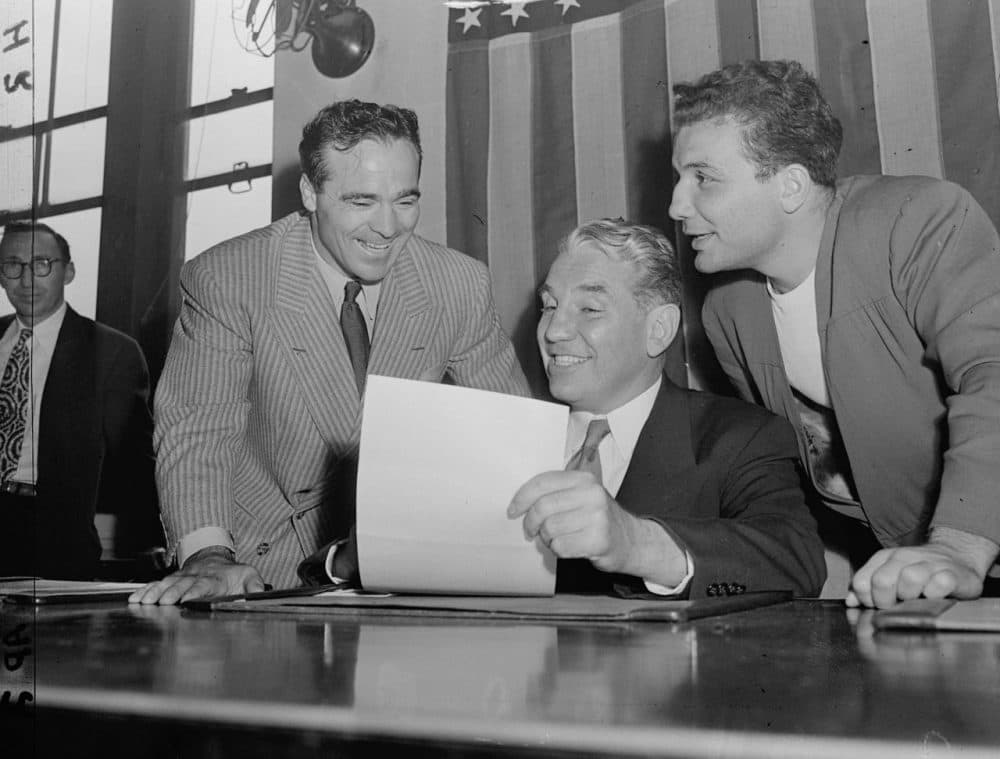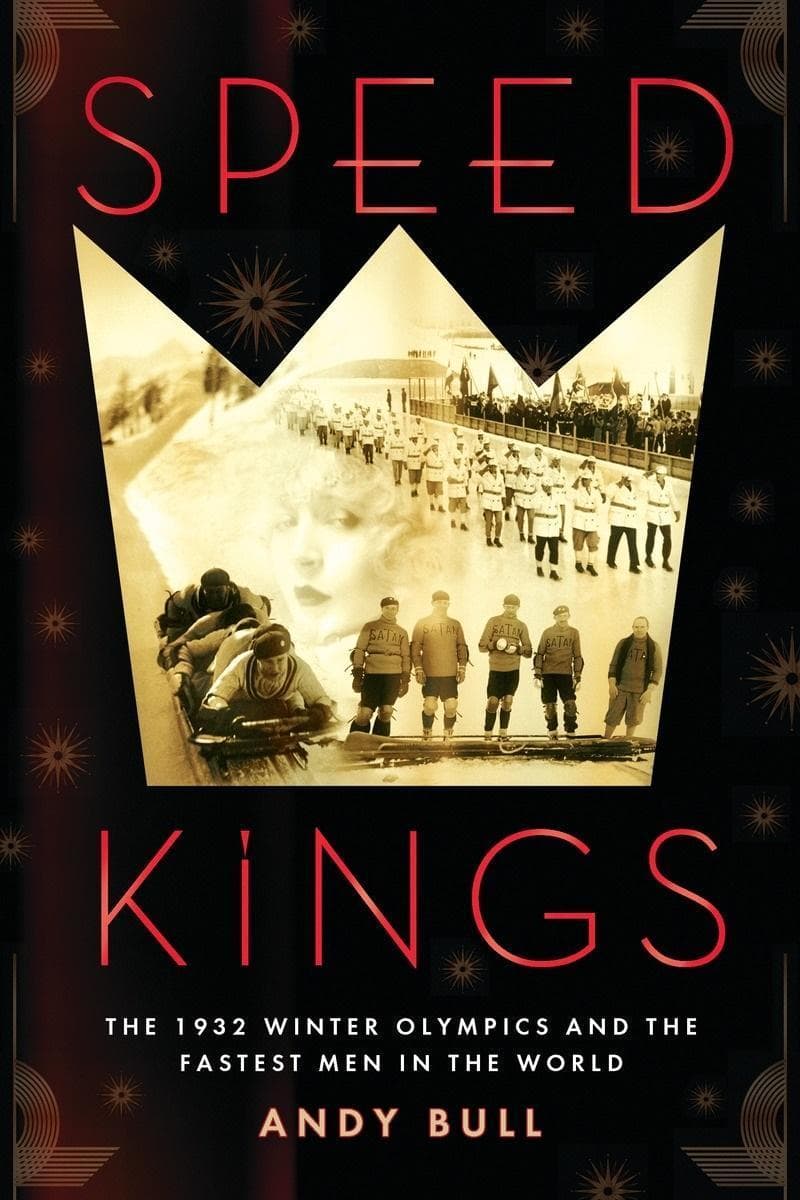Advertisement
'Speed Kings' Profiles Larger-Than-Life 1932 Olympic Bobsledder
Resume
In his new book, "Speed Kings: The 1932 Winter Olympics and the Fastest Men in the World," Andy Bull presents the life stories of four men who made up one of the U.S. bobsledding teams at the 1932 Olympics.
Perhaps the most intriguing of those bobsledders was Eddie Eagan.
Bull tells Eagan's story to Only A Game.
AB: Gosh, writing about him makes me feel very inadequate, you know? You're like, "Well, this guy had done so much by the time he was my age! Goodness, me!"
It was while working on this ranch that Eddie first discovered that he had this great gift in life. And the gift Eddie had was his left-hand punch.
Andy Bull, author
The first real competitive fights were around and about Colorado. He traveled to Cripple Creek, for instance, to box the champion of the local mine there. He was working at a cannery at the time. The story, as he tells it, is that the foreman at the cannery was a real bully, and he used to pick on the workers. One day, he made the mistake of picking on Eddie. The words escalated. Things got heated. Eddie ended up laying the foreman out flat on his back. After that, the foreman never gave him any trouble anymore. It also meant that Eddie became the cannery champion, which meant he had to go into matches against the champions from the other factories around about the community he grew up in.

His first few fights in life, he won them all pretty easily. One day, he got the opportunity to fight an up-and-coming boxer who was called Jack Dempsey.
Jack Dempsey was still working his way up, but Eddie had heard of him, and Eddie reckoned he had the measure of him. He was a pretty cocksure kid. And he steps into the center of the ring and he hits Jack Dempsey with his left. The great writer Damon Runyon called it "Eddie's steamshovel left." That's how good this punch was: it had its own name. And it caught Jack Dempsey on the chin, and Eddie describes how Jack Dempsey — he blinked, he smiled and then he started to hum to himself. He started to hum the song "Everybody Two-Step."
Eddie was totally confused by this, and he says the next thing he knew, the roof fell in. It was only when he came to, of course, that he realized what had happened was that Jack Dempsey had hit him. He opened his eyes, and Jack Dempsey was smiling there, and he said, "Don't try anymore of the funny stuff, kid."
They became great friends, and Jack Dempsey was one of the guys who said to him, "Look Eddie, you're a good boxer, but you're a smart kid. If I were you, I wouldn't turn pro. You should stick to the books."
Yale And Beyond
He stuck out like a sore thumb at Yale. He really wasn't comfortable in that world, because he felt his manners were too rough. He really won the respect of people at Yale when he snuck off to go to box for the Amateur Heavyweight Championships of the USA. And he actually won that title, so he made an awful lot of friends after that.
He joined the army at the end of World War I. And, he was boxing there in something called the Inter-Allied Games, which was sort of a mini-Olympics held in Paris after the war was over. And he did so well there that he won a lot of admirers, one of whom was the king of Montenegro, who made Eddie a count to reward him for his great victory. Because of that, he ended up getting a seat at the signing of the Peace Treaty of Versailles, which is one of the great events of the 20th Century. And Eddie was there for that, front and center.
Eddie was from a time when you could be an athlete, you could be an Olympic champion, but you could also be so many other things in life.
Andy Bull, author
He went on to study at Oxford in England. He was a Rhodes Scholar there. Once he had finished studying at Oxford, he decided he was going to travel the world and challenge the heavyweight champion of each country he visited to a fight. He really did this. He beat the heavyweight champions in India, in Australia, in Hong Kong, in Vietnam, in South Africa. And when he finally returned to America he said, "I'm now the Unofficial Heavyweight Champion of the World."
He won his summer Olympic medal as a boxer. A decade later, he was entering life as a lawyer. And he was finding life as a lawyer a little dull. He was feeling "a little cobwebby" — was how he put it — until, one night, he got a phone call from an old friend of his, a man called Jay O'Brien. Jay was putting together the U.S. team for the 1932 Winter Olympics: the bobsledding team. And he decided that he wanted Eddie to be in his bobsledding team.
[Eddie] said to his wife Peggy, "Peggy, you'll never guess what: I'm on the U.S. Olympic team as a bobsledder!" Of course, he had never been in a bobsled before, but that didn't stop him for a second. Eddie is the only man in history — the only athlete in history — who has won a gold medal at the Winter Olympics and the Summer Olympics.
He ended up becoming the first boxing commissioner for New York state. And I think he would admit, or he did admit, that that was the sort of one fight that licked him in the end. Even he wasn't able to clean up the world of boxing at the time. And then he started serving in the Eisenhower government as a sort of advisor on public fitness and health.
The thing about Eddie that I guess I love most of all is this idea of being an all-rounder. Eddie was from a time when you could be an athlete, you could be an Olympic champion, but you could also be so many other things in life. I mean, there are very few people in the world who have accomplished what Eddie did.
Bill's Thoughts On 'Speed Kings: The 1932 Winter Olympics and the Fastest Men in the World'
The “speed kings” themselves are bobsledders. Andy Bull saw in the wildly varied personal stories of the four men who triumphed at the 1932 Lake Placid Games an opportunity to explore not only the sports landscape of that time, but the culture at large.
[sidebar title="An Excerpt From 'Speed Kings'" align="right"]Read an excerpt from "Speed Kings" by Andy Bull.[/sidebar]
For the purposes of a radio story, I asked the author to tell the story of Eddie Eagan, whose bobsled experience before the Games might be charitably characterized as “limited.” He was named to the team before he’d ever ridden on a bobsled.
The stories of the other three bobsledders, if not quite as fantastic as Eddie's, are also grand. It’s perhaps too often said of books set in sports that even people who don’t care about sports will enjoy them. Regarding "Speed Kings," it’s true. Andy Bull is a fine storyteller and he handles an abundance of great material with contagious joy.
This segment aired on November 7, 2015.
